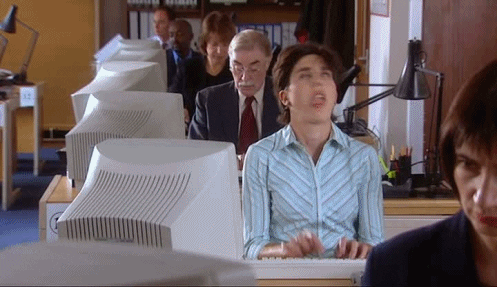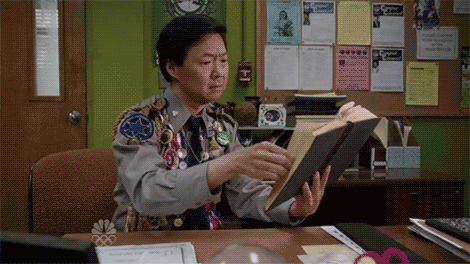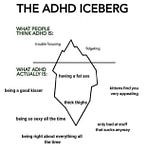Yesterday my brain was having a real ADHD day. I had a ton of papers to print out for uni, so I went to the library and spent 45 minutes squirreling them out from the internet and downloading them onto a USB so I could print them off on the library printer. On the walk from my chair to the library computer, a distance of about 4 metres, I lost the USB. I searched and searched, and then a librarian (god bless librarians!) eventually found it under the keyboard. It went like that all day. Going from the house to the car five times, fetching forgotten items, one by one. Keys left in the ignition. Glasses left in the bathroom. Why am I in this room? What am I meant to be doing here? Why am I holding a potato?
On days like these, the engine of my brain coughs and splutters and powers down mid-task, and I must run my to-do lists over and over to hold them in place. It’s a problem with working memory: the ability to hold an idea in place and to conceptualise the steps needed to action it, and the ability to ignore the things that are more compelling.
I notice when I’m having a day like that now. I take note that my brain is spotty and patchy. I try to drink water, and keep my enviroment calm, and factor in breaks for my brain. It’s a lens of understanding that is impacting hugely on my studies.
I’m in my second semester of uni now, doing a Master of Autism and Neurodivergence. I’m doing one subject at a time, and I set Wednesdays aside for it. On this day I have one lectual and one tutorial, and several videos and readings to absorb.
Everything about studying is different now, post-diagnosis. Reading an academic paper is, for example, a whole new experience. If my mind wanders, or I don’t understand a concept, I stop. I re-read. I might Google a little to search out some background knowledge, and then I go on. A paper isn’t ‘read’ when I have raced through it and dinged some invisible bell at the end. It’s read when I have actually understood it. This active process, I’ve realised, of pausing and taking notes and thinking along the way, means that each paper frames and deepens my knowledge from the last. Who knew? Not me, through a previous undergraduate and Masters degree, completed via sweat and all-nighters and Last Minute Larry adrenalin.
It all feels a bit like when I first took ADHD meds and the bees in my brain stopped swarming. You mean you people are just walking around like this, all the time? All the time?
When I wrote my first paper for this course, it was the first academic study I had done in twenty years. Surrounded by notes, I told my teenage daughter how much work I had to do. She was sympathetic. I’m sorry it’s so stressful, Mum.
I was taken aback. Stress? I explained to her that the ‘stress’ of this is going to take ages, I have so much to read, I don’t understand any of this stuff yet is absolutely nothing compared to the stress of here we go again, pulling an essay out of my arse, I can’t believe I did this again, next time I will not do this, I promise, I promise. There was some I hate myself involved through all of this, but mostly, it was so painful that I dissociated from it, refusing to truly look it when this happened before, and before, and before. There was a room in my mind where I locked those feelings away, and on the occasions that I opened the door and looked at the patterns of behaviour stacked against the walls, the experience was so excruciating that I double-locked the door against next time. Better to forge full steam ahead and make the promise: next time, next time, next time.
Next time, of course, it would happen again: another semester of lost notes and missed lectures and a sharp, last-minute, pattern-making Hail Mary pass at the material. Smoke and mirrors. Bait and switch. Watch me pull a rabbit out of this hat! This kind of cortisol-and-caffeine fuelled last minute work can finagle you a pass, and sometimes even produce an accidental moment of brilliance. But it’s a fake-out. It’s cheap, and you know it.
There’s a different feeling I am experiencing now, one that is borne of a long time spent engaging with the material, of sustained focus and slow unfurling of knowledge. It’s a new kind of wall. Rather than Brendans Beehans ADHD Wall of Awful, made up of those past bricks of Shame and Failure, this is, brick by brick, a Wall of What The Fuck, I Think I Get This.
Writing that first assignment, the stress my brain felt was something like the aching of muscles after a strong workout. To complete it, I needed time, which I had given myself, and I needed to to keep up with the incremental weekly readings and lectures, which I did. I had always before, been chronically in my own way, but now, for the first time, Icould see a clear path ahead.
I wrote that paper in a way I never had before. Like a proper student. I drafted and rewrote it as I my understanding of the material grew, and I finished it early and let it sit before I took a final pass. Let’s just say that if I was at school, somebody might have hung me by my underpants on a coat hook.
I understand now how ADHD can make for immense difficulty with the executive function involved in completing multiple steps of a process. Planning, working memory, organising, impulse control, focus: all of these need to working in concert to corral the brain to study effectively.
It’s like climbing a ladder that only illuminates steps one at a time. As you climb the ladder, slowly and steadily (aka neurotypically) you build on the work of the level below. With undiagnosed, unmedicated neurodivergence, the ladder is broken. Every step up represents another place to fall off: a missed lecture, a lost book, a misread assessment date. By the time the top of the ladder appears, the assignment or exam that asks you to perform the work of every step along the way - you are fucked. You must hustle, scramble, pray for a pass, and vow that next time, next time, you will not let this happen. And the kicker is that nobody, including you, can see that you are climbing a broken ladder. The ladder - you can all see - is fine. It’s the person climbing that is broken: lazy, unfocused, impulsive. With the history to prove it.
When I handed that first assignment in, it was as good as I knew how to write it. I had never felt that I was capable of such focused, incremental academic work. I felt pride, and also pain at the lost opportunity of learning this skill so late in life. It’s not too late for everything. Of course it’s not. But it’s too late for a lot. In the old days, each new semester was a chance for the New Me: this time, this time I will be different. For the first time, I feel like that might possibly be true.
As I have learned the truth of how my brain works, and what it needs, I have unlearned the stories I told myself for so long. I opened the door of that room full of failures, and let the cleansing light in. Now that I tutor kids in English, we talk about the importance of understanding your own process, without judgement. If it takes watching three episodes of Friends to get started on your work, that’s not a problem in iself, as long as you factor in that extra two hours of time.
I’m starting work on my fourth big assessment now. I’m coming to understand that it takes me a long time to grasp a concept, to structure my thoughts, and to carve clarity out of my mess of notes. I’ve learned to give my brain what it needs to operate well: time, calm and quiet.
Now, if only I could train it to remember why I am holding this potato.
ADHD Series
ADHD Files #1: When Perimenopause Meets ADHD
ADHD files #2: It’s Neurobiology, Baby!













